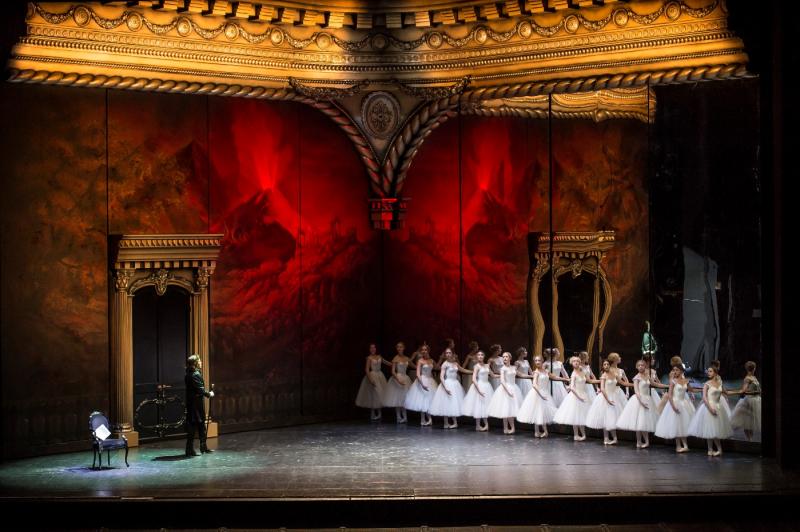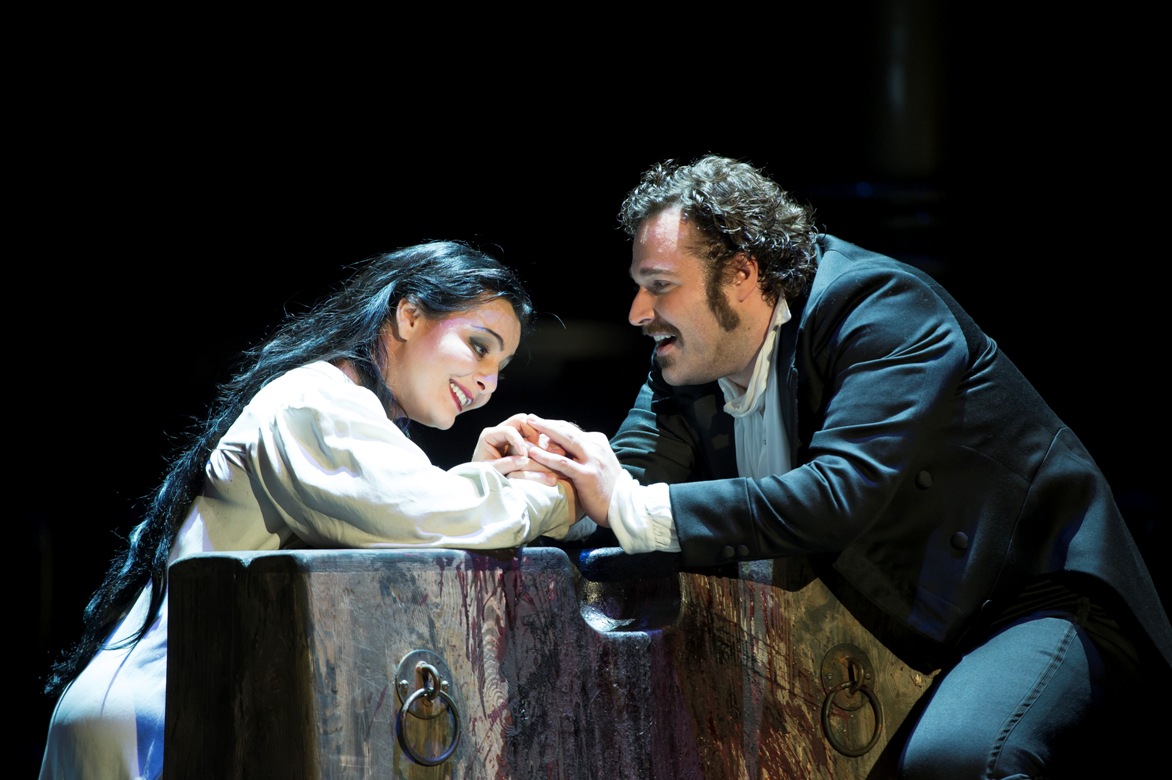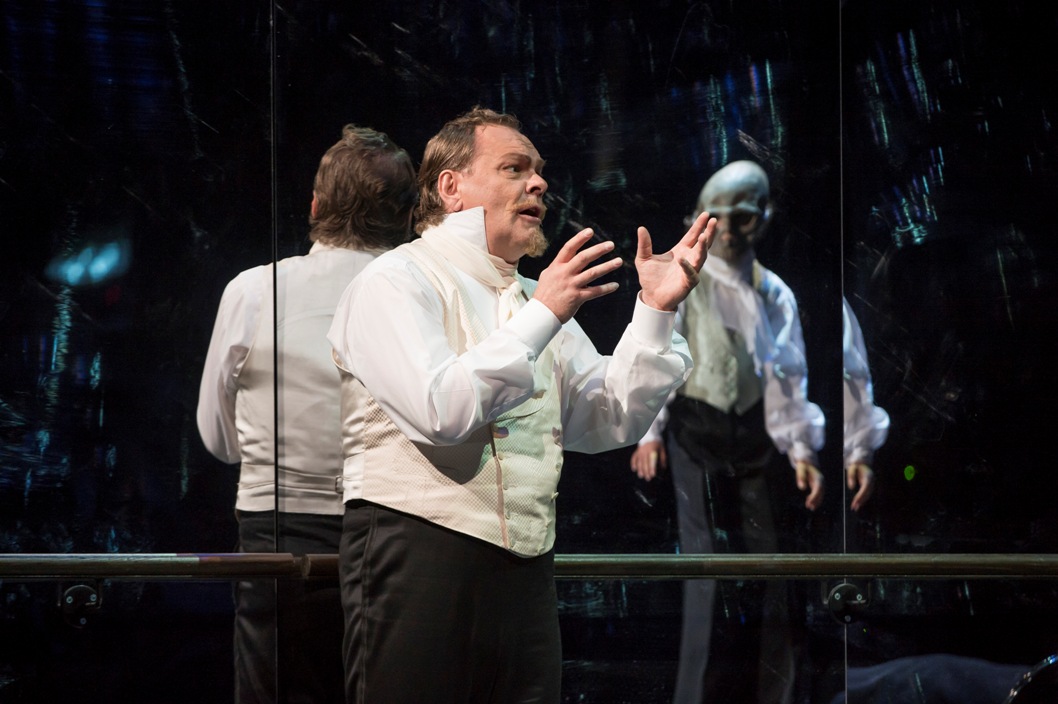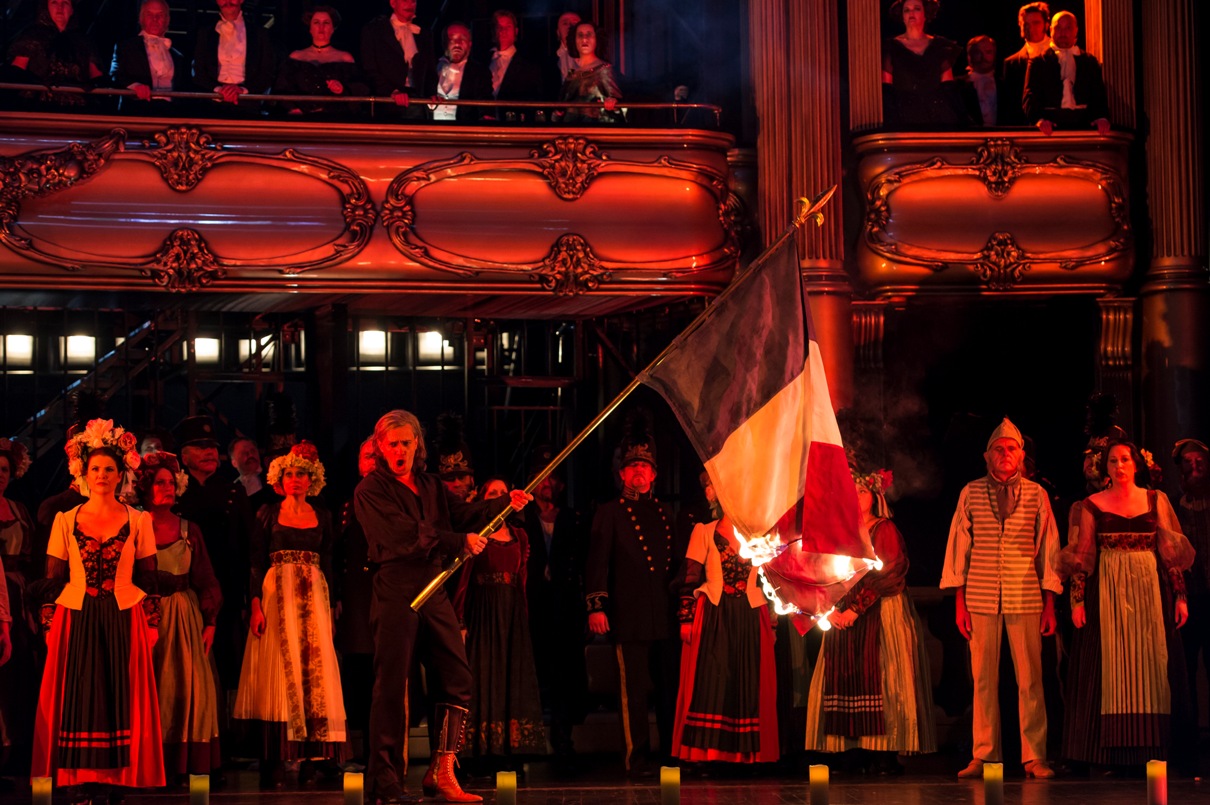Les Vêpres Siciliennes, Royal Opera | reviews, news & interviews
Les Vêpres Siciliennes, Royal Opera
Les Vêpres Siciliennes, Royal Opera
Plenty of vintage Verdi in a long-neglected opera, superbly conducted and decently sung

First fanfare had to be for the Royal Opera House’s main gambit in Verdi bicentenary year, staging its first ever Sicilian Vespers 158 years after the Paris premiere. Any of Verdi’s operas from Rigoletto onwards deserves the red carpet treatment, and this unwieldy epic, with its opportunistic grafting of a melodramatic plot on to the Palermitans’ massacre of the French in 1282, has more than enough vintage music to be worthy of anyone’s close attention.
A second round of trumpets in a meaner key sounded for me on learning that eternally inconsistent prima donna Marina Poplavskaya would not be singing the first three performances, her place taken by the reputedly more reliable Lianna Haroutounian. And solemn trombones heralded the UK debut of Norwegian director Stefan Herheim, much feted on the continent.
 Both high hopes were only half fulfilled. Herheim’s thought-through consistency, and his bane, is to set the whole thing in an opera house circa 1855, the year of the first performance, and to give the opera the unofficial subtitle The Ballet Master’s Revenge. True, some back history in the plot needs exposition, and Herheim takes the opportunity to speed through it while Pappano set up high expectations with the tense rhythms and the one glorious melody of the Overture. The French burst in on preparations for a rehearsal – of Giselle, possibly – wounding Erwin Schrott’s inappropriately effete choreographer Procida, Sicilian patriot in the original, and commander Guy de Montfort (Michael Volle) proves himself a 30-second man in a risible "rape" of a ballerina. Cue the child who will grow up to be a freedom-fighter for the Sicilian cause, Henri (stalwart tenor Bryan Hymel, with a heavily symbolic boy actor as his younger self).
Both high hopes were only half fulfilled. Herheim’s thought-through consistency, and his bane, is to set the whole thing in an opera house circa 1855, the year of the first performance, and to give the opera the unofficial subtitle The Ballet Master’s Revenge. True, some back history in the plot needs exposition, and Herheim takes the opportunity to speed through it while Pappano set up high expectations with the tense rhythms and the one glorious melody of the Overture. The French burst in on preparations for a rehearsal – of Giselle, possibly – wounding Erwin Schrott’s inappropriately effete choreographer Procida, Sicilian patriot in the original, and commander Guy de Montfort (Michael Volle) proves himself a 30-second man in a risible "rape" of a ballerina. Cue the child who will grow up to be a freedom-fighter for the Sicilian cause, Henri (stalwart tenor Bryan Hymel, with a heavily symbolic boy actor as his younger self).
The advantage in this is a sequence of striking stage pictures beautifully lit by Anders Poll and graced by Philipp Führhofer's adaptable set, hinting at Siciliana in two murals; the two sides of that extraordinary island are stylised in an erupting volcano with classical ruins on the one hand, a pastoral scene on the other. The walls and opera loggias move far more gracefully than two of the singers. Haroutounian as hostage to the French Hélène and Hymel (pictured above in Act Four) carry out the usual stand and deliver stuff: is Herheim trying to make a virtue of necessity by making everything that Verdi’s Donna Anna and Don Ottavio do or sing theatre? His dramaturg Alexander Meier-Dörzenbach enlightens us in the programme: “the actual conflict in this production…is not about nationalities or politics, but about illusion and disillusion of and within the theatre.”
 So that’s fine only when Herheim’s concept doesn’t betray Verdi’s. The first two acts are full of rather stiff musical ideas being tried out for size. The few glories rest with the orchestra, the violins of which under Pappano are more seductive singers than anyone on stage. We have high hopes for Schrott’s posturer but this very loud bass overshoots the mark and very often the pitch in a wild account of Procida’s Act Two aria. And that act's weak if experimental curtain is confused when Verdi’s boat of partygoers turns into a group of skull-masked zombies in clouds of dry ice.
So that’s fine only when Herheim’s concept doesn’t betray Verdi’s. The first two acts are full of rather stiff musical ideas being tried out for size. The few glories rest with the orchestra, the violins of which under Pappano are more seductive singers than anyone on stage. We have high hopes for Schrott’s posturer but this very loud bass overshoots the mark and very often the pitch in a wild account of Procida’s Act Two aria. And that act's weak if experimental curtain is confused when Verdi’s boat of partygoers turns into a group of skull-masked zombies in clouds of dry ice.
So far, so what. Then in Act Three the music, the drama and the singing go up several notches as Volle (pictured above) provides the star turn of the evening in phrasing and projecting with great distinction a beautiful, starkly orchestrated romance about the son he needs to win over. The quality remains Verdi’s best in the duet with Hymel’s Henri, both men getting to sing the opera’s most memorable melody (the one already heard in the Overture).

Erwin Schrott and Royal Opera Chorus in the Act Five denouement
The big function at which the freedom fighters are stalled by Henri’s new found filial duty is shorn of the superb "Four Seasons" ballet music we were originally promised. True, the cut is an option Verdi later permitted; if only there had been time for the Royal Ballet, withdrawn from the project and replaced by freelance dancers after original choreographer Johan Kobborg had "artistic differences" with Herheim, to resuscitate Kenneth MacMillan’s stand-alone choreography on intervening evenings. At least the main ballet's absence allows the opera to move swiftly to its first major crisis via a Masked Ball situation and Traviata-style party music. The massive ensemble, delivered out front, also delivers at the highest Verdian level.
More quality shines in Act Four: Hymel just about brings off Henri’s high-lying aria, surely the closest Verdi ever came to unorthodox Berlioz – who admired this work, by the way – and Haroutounian has her moments in a duet foreshadowing the one between the Infante and Elisabetta in Act Two of Don Carlo, though she can’t float a high, sweet line (Poplavskaya can, one respect in which she may score over her temporary replacement).
Execution of Hélène and Procida averted, the onstage theatre brought out shiny once more from under scaffolding, we’re returned to operatic parody in Act Five, pretty wedding numbers for the lovers – again a bit hit and miss – and Herheim’s problem of what to do with the nuptial “I do” signal for the massacre infinitely postponed by conventional trios. The end of this production misfires, but so too, perhaps, does Verdi’s at a time when his sense of music-theatre was still sometimes compromised by the set-piece formula. Not a bad evening, then, worthy neither of the boos nor the ecstatic cheers in the auditorium. The main thing is that we’ve got to hear a curate’s egg by a true master in its original language, and for that I at least am profoundly grateful.
rating
Share this article
The future of Arts Journalism
You can stop theartsdesk.com closing!
We urgently need financing to survive. Our fundraising drive has thus far raised £49,000 but we need to reach £100,000 or we will be forced to close. Please contribute here: https://gofund.me/c3f6033d
And if you can forward this information to anyone who might assist, we’d be grateful.

Subscribe to theartsdesk.com
Thank you for continuing to read our work on theartsdesk.com. For unlimited access to every article in its entirety, including our archive of more than 15,000 pieces, we're asking for £5 per month or £40 per year. We feel it's a very good deal, and hope you do too.
To take a subscription now simply click here.
And if you're looking for that extra gift for a friend or family member, why not treat them to a theartsdesk.com gift subscription?
more Opera
 La bohème, Opera North review - still young at 32
Love and separation, ecstasy and heartbreak, in masterfully updated Puccini
La bohème, Opera North review - still young at 32
Love and separation, ecstasy and heartbreak, in masterfully updated Puccini
 Albert Herring, English National Opera review - a great comedy with depths fully realised
Britten’s delight was never made for the Coliseum, but it works on its first outing there
Albert Herring, English National Opera review - a great comedy with depths fully realised
Britten’s delight was never made for the Coliseum, but it works on its first outing there
 Carmen, English National Opera review - not quite dangerous
Hopes for Niamh O’Sullivan only partly fulfilled, though much good singing throughout
Carmen, English National Opera review - not quite dangerous
Hopes for Niamh O’Sullivan only partly fulfilled, though much good singing throughout
 Giustino, Linbury Theatre review - a stylish account of a slight opera
Gods, mortals and monsters do battle in Handel's charming drama
Giustino, Linbury Theatre review - a stylish account of a slight opera
Gods, mortals and monsters do battle in Handel's charming drama
 Susanna, Opera North review - hybrid staging of a Handel oratorio
Dance and signing complement outstanding singing in a story of virtue rewarded
Susanna, Opera North review - hybrid staging of a Handel oratorio
Dance and signing complement outstanding singing in a story of virtue rewarded
 Ariodante, Opéra Garnier, Paris review - a blast of Baroque beauty
A near-perfect night at the opera
Ariodante, Opéra Garnier, Paris review - a blast of Baroque beauty
A near-perfect night at the opera
 Cinderella/La Cenerentola, English National Opera review - the truth behind the tinsel
Appealing performances cut through hyperactive stagecraft
Cinderella/La Cenerentola, English National Opera review - the truth behind the tinsel
Appealing performances cut through hyperactive stagecraft
 Tosca, Royal Opera review - Ailyn Pérez steps in as the most vivid of divas
Jakub Hrůša’s multicoloured Puccini last night found a soprano to match
Tosca, Royal Opera review - Ailyn Pérez steps in as the most vivid of divas
Jakub Hrůša’s multicoloured Puccini last night found a soprano to match
 Tosca, Welsh National Opera review - a great company reduced to brilliance
The old warhorse made special by the basics
Tosca, Welsh National Opera review - a great company reduced to brilliance
The old warhorse made special by the basics
 BBC Proms: The Marriage of Figaro, Glyndebourne Festival review - merriment and menace
Strong Proms transfer for a robust and affecting show
BBC Proms: The Marriage of Figaro, Glyndebourne Festival review - merriment and menace
Strong Proms transfer for a robust and affecting show
 BBC Proms: Suor Angelica, LSO, Pappano review - earthly passion, heavenly grief
A Sister to remember blesses Puccini's convent tragedy
BBC Proms: Suor Angelica, LSO, Pappano review - earthly passion, heavenly grief
A Sister to remember blesses Puccini's convent tragedy
 Orpheus and Eurydice, Opera Queensland/SCO, Edinburgh International Festival 2025 review - dazzling, but distracting
Eye-popping acrobatics don’t always assist in Gluck’s quest for operatic truth
Orpheus and Eurydice, Opera Queensland/SCO, Edinburgh International Festival 2025 review - dazzling, but distracting
Eye-popping acrobatics don’t always assist in Gluck’s quest for operatic truth

Add comment